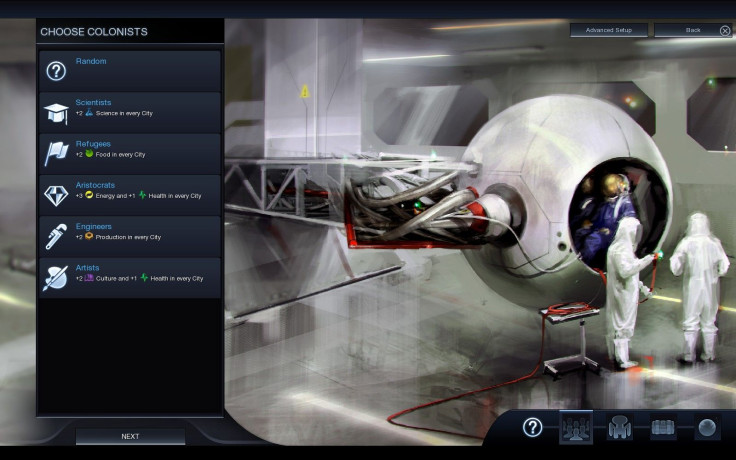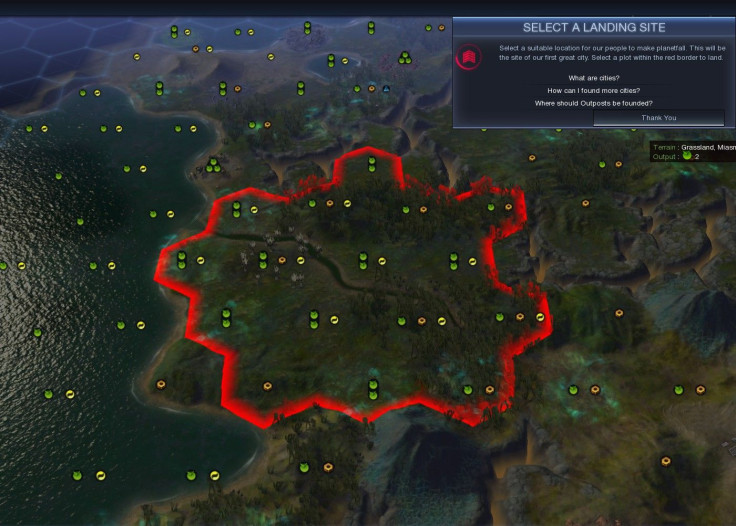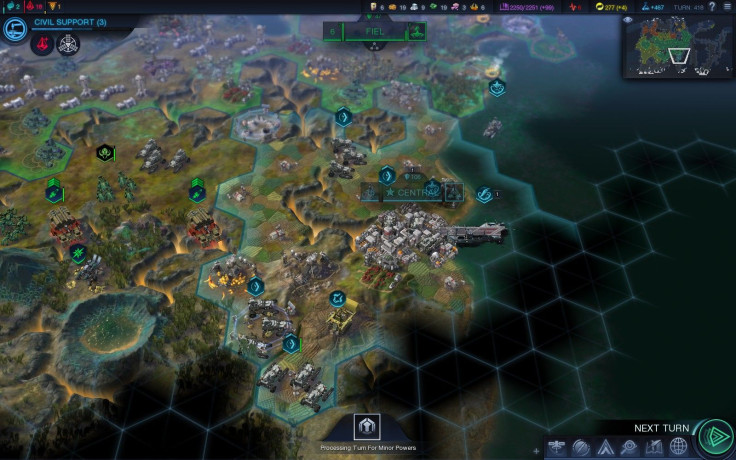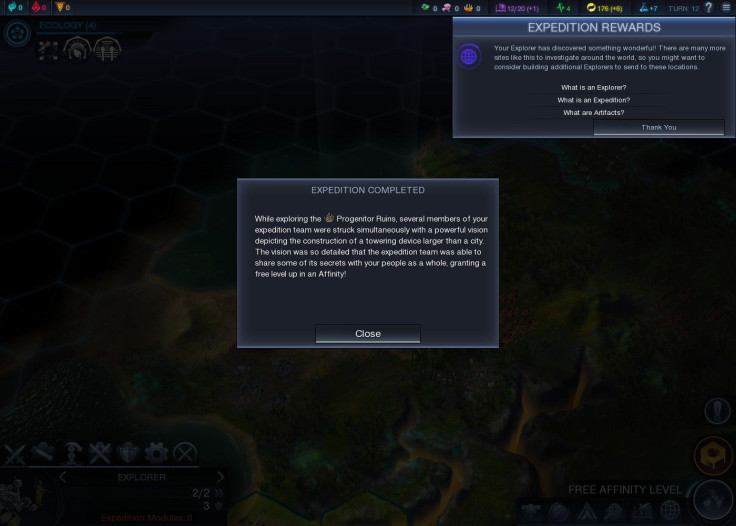I’m not the ideal Civilization player.
I’ve never invested much more than 100 hours into any one entry in the series, have completed less than 10 campaigns over the years and don’t have anything resembling the patience/skill needed to enjoy multiplayer Civilization.
I don't even remotely enjoy other titles in the 4X genre.
That said, I’ve had some good times with the franchise; particularly Civilization IV and both of its post-launch expansions. I wasn't nearly as fond of Civilization V, a sentiment that more-dedicated Civilization fans in my social circle tell me was pretty common at launch, but I was excited to play Beyond Earth.
My first impression showed me exactly the kind of game you'd expect from the folks at Firaxis, albeit with a few tweaks and a new coat of paint to help set it apart from its predecessors. However, the latest entry in Sid Meier’s vaunted Civilization franchise hardly feels like the bold/meaningful departure the studio claimed it would.
Beyond Earth isn’t without its bright spots. Match creation and the recycled Civilization V mechanics have been improved and now players have more (but not enough) control over the pace of each Beyond Earth match. Also, I found the "find a new home planet" premise added extra weight to each match. Even the overhauled Setup menu hammered home the notion that players must settle new and unexplored corners of the universe. Or die trying.
Unfortunately, Beyond Earth fails to evolve in any meaningful way past these upgrades. It fails to change how I feel about this stagnant franchise and seems almost like an excuse for 2K and Firaxis to charge fans $50 for an ambitious Civilization V mod. The franchise has its fans, I know, and more of the same might very well appease certain segments of the Civilization community. But I doubt I’m the only one who hoped for something beyond average from Beyond Earth.

In Civilization: Beyond Earth, players once again step into the shoes of a major head of state. Only this time you won’t be shaping a civilization that you learned about in one of your history classes. Instead, you lead one of several bands of colonists forced to leave Earth in search of a new home for mankind. Your departure was forced by an event known as “The Great Mistake”, and your allegiances will lie with the corporation that backed your group’s expedition to humanity’s next home.
Naturally, Beyond Earth wouldn’t be much of a game if resettling mankind was as simple as picking out a new planet and plopping down a few buildings. And it wouldn’t be much of a Civilization game without diplomacy. Corporate politics dictate how civilizations interact with one another, and it’ll also be up to you to decide how your colonists react to the aliens on your new home world.
Will you ignore the creatures that already call the planet home? Hunt down every last one and ensure their extinction? Maybe try to find some sort of balance between the two?
Of course, the various species inhabiting your new home only represent one of the many obstacles on your path to victory and – with the sole exception of Siege Worms – really aren’t much more intimidating than the Barbarian hordes they’ve replaced. They’re a bit more capable during the early game, but become far too easy to neutralize later on.
Curiously, aliens never seem to get any stronger over the course of the game even if you decide to recruit a few units of your own. By the time you've earned a few Affinity upgrades, aliens won't even register as a threat to anything except (maybe) the route you're currently traveling between two points. Not because they somehow pose a bigger threat on the road. But why would you want to stop to squash some bugs when leading your armed forces on a warpath to an opposing capital?

Civilization: Beyond Earth also makes several changes to the turn-by-turn gameplay that has long driven the franchise. Sadly, most of these changes are just UI alteration, and even the game's tech web (which gives players an amazing amount of flexibility) proves to be as much a problem as it is a solution.
At first glance, the tech web looks to offer a freedom of progression that previous Civilization titles did not. The only problem is that most of the research is linked, with associated branching extensions that tie into the Affinity system that debuts in Beyond Earth. This eventually creates intended progression paths so even though you're still technically allowed to roam a bit it’s not as wide open as it seems.
The other big game change is the addition of the Orbital Layer; the area that each players’ satellites call home after being launched. Rather than giving players the opportunity to use the Orbital Layer to carry out acts of war, satellites don't serve many purposes outside of gathering extra energy and helping clear miasma, a poisonous gas produced by your new home planet, when it appears in your territory. Sadly, the new zone doesn't add much to the Civilization experience and I can actually count on one hand the number of satellites I bothered to build during my time with the game.
Not that these orbiting worker drones aren't without their own benefits. For starters, satellites are a bit easier to protect that your standard worker units, which can still be captured by moving an opposing military unit into the same space on the map. Instead, players hoping to down an opposing satellite are forced to waste an attack action and only certain ranged units are capable of striking an orbital unit.
Strangely, satellites are also the only units that don't receive Affinity upgrades. The Affinity system confers upgrades on the various military units under your control as you progress through each ladder. However, the upgrades earned through progress in the various Affinity trees don't really feel all that different from one another. It might be for the best that they didn't try to squeeze another needless progression path in, too.

The last major change for Civilization: Beyond Earth is the new quest system. Quests have been added to what might be the biggest 4X franchise on the planet to slightly expand players' ability to ensure their followers aren't left without food, energy and healthcare.
The Quest Decision system allows players to decide how certain buildings and discoveries will impact the growth of their colonies, and how you'll benefit from certain resources. It’s useful, but the last thing Beyond Earth needs is another time-consuming feature and they ultimately just became “one more thing to do.”
My biggest complaint about Civilization: Beyond Earth is also my oldest complaint about the franchise: pacing. Firaxis still hasn't found a way to keep matches moving along at a decent pace after players reach the mid/late-game. I’ve always had problems finishing Civ games because the late game isn’t as fast or as fun as the early stages. This is doubly true for the action in Beyond Earth, a game that never quite seems to deliver an outcome half as enjoyable as the mysteries presented to the player at the beginning of each match.
Generally, it's around the Turn 200-300 mark that I abandon whatever Civilization I'm playing and move on to something else. Each of my Beyond Earth games finished around Turn 400 and are currently running an average of 12-hours each. In fact, I think I completed more matches (three) for this review than I have during my 200+ hours with previous entries in the series, but I'm not sure that would have actually been the case if it wasn't my job to see each campaign through to the end.
The exact point at which your own game will bog down into a seemingly never-ending series of unit assignments and production decisions will vary -- depending on what you've been building -- but there doesn't seem to be any avoiding the slowdown. Even switching to the Quick game speed didn’t do much to alleviate my frustrations, either.

Worse, Civilization: Beyond Earth isn’t especially difficult, and at points feels needlessly tedious. Some of the game’s biggest time sinks seem to exist for the sole purpose of keeping the clock ticking for a few extra minutes in each match. Upping the difficulty requires you to pay a bit more attention to the various other leaders who’ve settled near you, but the strategy for surviving and thriving on what is billed as an entirely unfamiliar planet feels just a bit too easy.
In Beyond Earth, you need to have just enough patience to avoid making the dumbest mistakes possible. Assuming you don't try to declare war on the most militarily-advanced corporation or start building around a couple of Siege Worms, there doesn't seem to be much you can really do to doom your people. As a result, the game feels more like a chore than a challenge and this doesn't exactly leave me wanting to invest another 10-12 hours of my time into a Civilization campaign where victory seems all but guaranteed.
Elsewhere, the artificial intelligence driving the heads of your rival corporations could definitely use a bit of tweaking. If for no other reason than they don't really seem cut out for the job of pioneering a new world.
During a Civilization: Beyond Earth match in which I took an aggressive approach to securing victory, there were about half a dozen situations that saw resource-deprived leaders offer me Favors -- a new type of currency that can be used to sway the minds of leaders you've aided in the past -- in exchange for goods not currently available in their territory. The problem here is that the leader(s) in question wouldn’t actually accept the deal they’d just offered me despite the fact that I hadn’t altered the terms of the arrangement before clicking “Accept.”
There were countless times that I found myself being condemned by faction leaders that were alive solely because of my help, and many situations where I'd managed to offend people for reasons that couldn't be deciphered. I actually had one corporation declare war on me for clearing miasma from a single tile in their territory. It's f--king poison! Why are you mad?!
Compounding my frustration is the lack of post-game data in Beyond Earth. Firaxis has stripped out the various post-game graphs, charts and rankings that previously let you know how you'd performed in a complete Civilization match. Normally, I found myself bottoming out the “Dan Quayle” tier in the post-game rankings but even embarrassing feedback is better than none at all. Besides, a few relatively easy wins have me thinking I might finally move up a rank or two.

Civilization: Beyond Earth Review - Final Verdict
At the end of the day, Civilization: Beyond Earth lacks a discernible focus and ultimately feels more like a half-assed Civilization V expansion. Only, it’s not priced like an expansion. It’s priced like a brand new game. And it certainly is not the spiritual successor to Alpha Centauri fans are expecting.
I'm well aware my frustration in some of these situations could very well be the result of my own shortcomings as a Civilization player that are drawing out my experiences. Given the series' ongoing popularity, this sort of pacing is clearly resonating with more than a few members of the PC gaming community. I admit it's definitely not for me.
In the past, I could justify the dozens of hours that Civilization demands of its players, partially because I had more free time but mostly because the strategy game felt like it was making you work for each win. Obviously, not everyone will feel the same way I do, but it would be nice if the team at Firaxis could find a way to trim just a bit more fat from the base Civilization: Beyond Earth experience.
If you've enjoyed Civilization: Beyond Earth's predecessors, I have little doubt that Firaxis' latest project will cost you at least a few dozens of hours of your free time. But if you were thinking about using Civilization: Beyond Earth as your entry point to the franchise, don’t. I recommend spending your cash on a copy of Civilization V instead.
Score - 3/5
DISCLAIMER: This Civilization: Beyond Earth review is based on time spent with a Steam copy of the game provided to me (free-of-charge) by 2K Games; however, neither the publisher nor Civilization: Beyond Earth developer Firaxis retained any say in the contents of this review.
Want to share your thoughts on Civilization: Beyond Earth? Disappointed that the latest entry in the Civilization series doesn't feel a bit more unique? Glad that the bulk of the Civilization V experience has been more-or-less preserved in Beyond Earth?
Let us know in the comments section


















